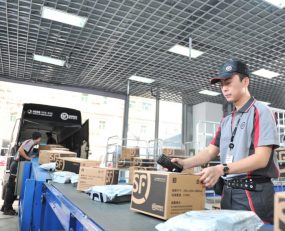
SF Express has encountered some financial turbulence. Much to the dismay of the Chinese stock markets, the Shenzhen based giant’s most recent results show that the company fell into a loss of CNY989m ($152m) for the quarter ending March 31, (Q1-21). Revenue, which had been growing respectably through 2020, has gone into reverse. Notably, gross profit has also fallen heavily, from CNY5,205.18m to CNY2,948.96m for the previous quarter. For Q1-20 gross profit was CNY5,279.87m. Operating profit also fell from CNY2,161.33m in the previous quarter, to a loss of CNY1,144.46m in Q1-21.
Numbers such as these imply that margins are being squeezed, with the gross profit numbers suggesting that the price of physical transport assets is rising. The decline in revenue may be explained either by demand falling, which is unlikely in such a market, or prices softening. So, it is logical to assume that the core home delivery business of SF Express is under pressure.
Although demand for internet-retail services has jumped in China, there seems to be no relief in the continuing fierce competition for home-delivery services. The Chinese domestic express market has long been cut-throat. Over the past decade, the Chinese authorities have sought to regulate the huge number of smaller providers but the sector remains structured differently from, for example, the US with its reliance on a mix of mail monopoly and the two Express giants, now augmented by the logistics capabilities of Amazon. Internet-retailing may be central to the Chinese consumer economy but the home-delivery sector has had difficulty evolving away from a dependence on small and medium-sized couriers.
The latest numbers suggest that SF Express has not been able yet to utilise capital assets to establish a competitive advantage over smaller rivals. The likes of UPS, DHL and FedEx are highly capitalised, with large automated facilities that deliver economies of scale that smaller rivals cannot replicate. It seems that SF Express is striving to achieve this, with heavy investment in facilities, yet even DHL Express, a company with a large automated global network has built its profitability of high margin global premium services, avoiding local markets which are simply too unprofitable. It might be suggested that SF Express is facing this problem too.
This lack of profitability is probably the context of SF Express aggressive moves into contract logistics with the purchase of DHL Supply Chain’s China business and Kerry Logistics.
Source: Transport Intelligence, April 27, 2021
Author: Thomas Cullen